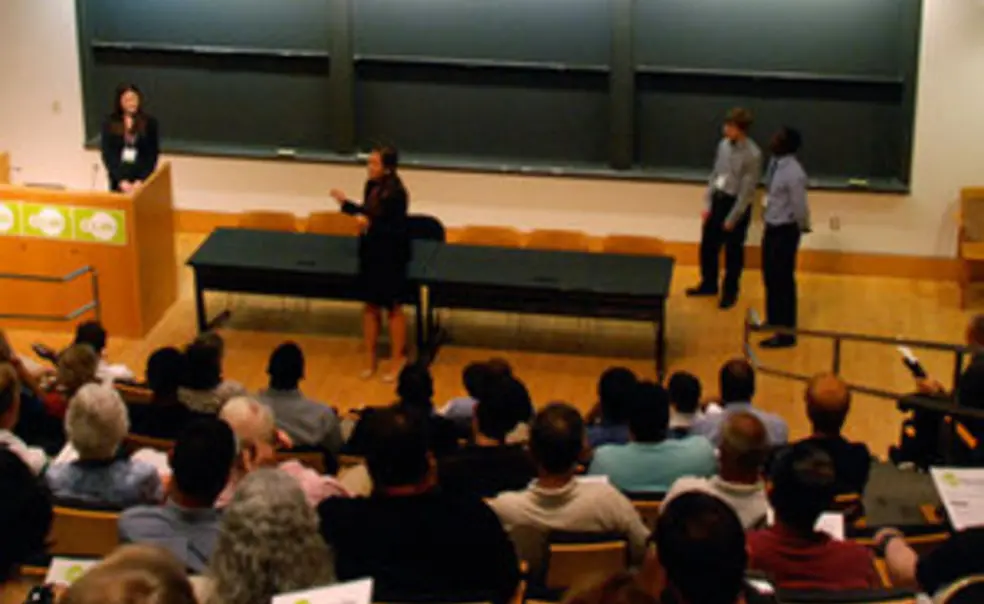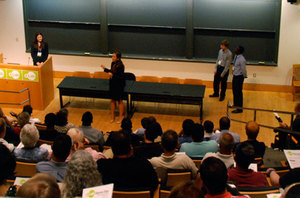New eLab program helps student startups prepare for launch
From left, Christine Baluvelt '12, Arielle Sandor '12, Luke Paulsen '14, and Eric Kuto '12 of the startup Duma present at the eLab demo program Aug. 15. (Photo: Gavin Schlissel '13)
The Princeton entrepreneurship lab (or eLab) hosted its inaugural demo day Aug. 15, showcasing startups founded by Princeton students. The presentations were the culmination of 10 weeks spent in the Keller Center’s new startup incubator, which grants summer fellowships for Princeton students to found companies under the guidance of professors and local entrepreneurs.
This summer’s startups included two social entrepreneurship ventures — one aimed at the Kenyan job market and another designed to incentivize academic achievement for at-risk children — as well as a new web library and a digital marketplace.
The eLab incubator funds students to stay at Princeton over the summer while they build businesses. Cornelia Huellstrunk, associate director of the Keller Center and administrator of the eLab program, explained that creating a community of entrepreneurs was critical to developing eLab’s first group of startups. Sharing work space, collaborating with peers, and participating in entrepreneurial training “gave students a unique opportunity to develop their ventures,” Huellstrunk said.
The summer eLab program is an offshoot of recent demand on campus for a stronger culture of entrepreneurism. For Duma, a text-message based job placement service in Kenya, the summer at eLab was the culmination of a plan that hatched at a Princeton hackathon — a kind of 24-hour jumpstart event designed to expose budding entrepreneurs to industry mentors.
Duma cofounder Arielle Sandor ’12 explained that the long-term, highly specialized mentorship eLab participants received distinguished it from the more informal hackathon setting. “Hackathons are short and you get the minimum viable product out, and don’t really focus on business model,” said Sandor. Over the summer, Sandor explained, eLab offered “a very different kind of mentorship — much more holistic.”

Four student-led startups received summer funding to build their businesses at the eLab. (Photo: Gavin Schlissel '13)
One subject that at times seems taboo at hackathons — finding investors willing to back an atypical business venture — was a major focus for students at eLab. Sandor’s Duma received legal advice for how to form a corporation in Kenya and help from lawyers and investment professionals for how to attract seed money. “We had to learn a lot of the technical lingo to figure out how to write a term sheet ... [Another] big one was the structuring of our initial investment terms.”
In addition to working with professional mentors, eLab participants shared their weekly progress with fellow eLab participants and met at local restaurants, over food furnished by the eLab. The process was a way for entrepreneurs to exchange ideas and help each other develop their business models.
Duma and the other new startups, Dewey (like the decimal system), MyGZPoints, and WantWarrior, all hope to launch in their respective markets this fall.
Gavin Schlissel ’13 is a molecular biology major from Moraga, Calif.














No responses yet